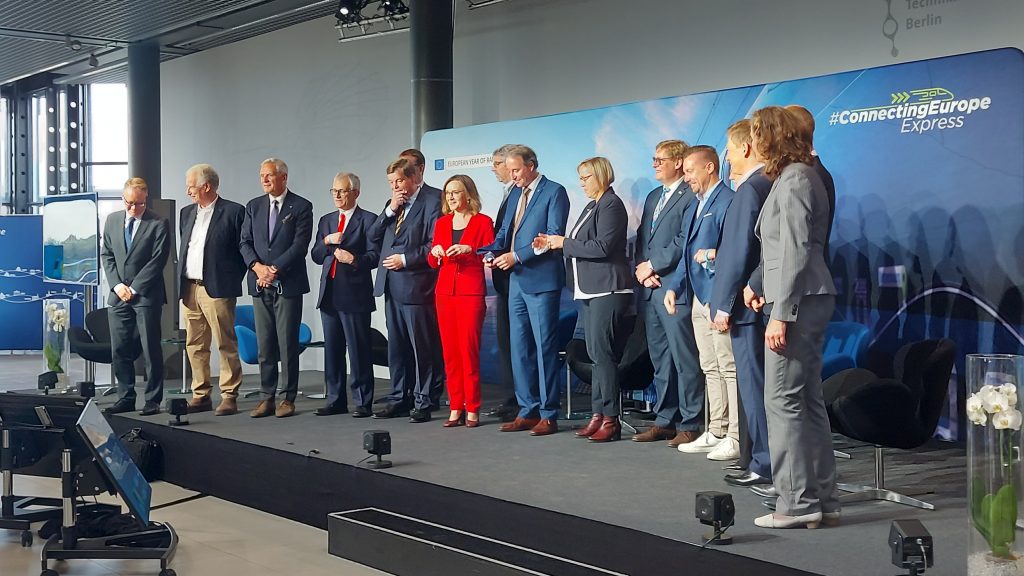IRJ on the Connecting Europe Express: The CEO of German Rail (DB), Dr Richard Lutz, says the German government should invest in rail infrastructure ahead of reducing track access charges, saying that the increase in passenger numbers will require large amounts of funding in the coming years. But the CEO and founder of FlixTrain parent FlixMobility, Mr André Schwämmlein, says this approach stymies competition and makes it harder for private entrants to operate on the German network.
The discussion came during a panel session on developing long-distance passenger services during the Building up a Network of Long-Distance Rail Services conference in Berlin on September 30, hosted as part of the Connecting Europe Express (CEE) train that is currently conducting a five-week tour across the European Union.
During the session, one of the first times Lutz and Schwämmlein have appeared alongside each other, the panellists were asked by the conference moderator Mr Kristian Schmidt, director, land transport at the European Commission’s Directorate-General for Mobility and Transport (DG Move), whether they thought rail access charges were too high in Germany, to which Lutz replied that he did not.
“There is no free lunch - someone has to pay,” Lutz said. “And if you reduce the excess charge to direct costs and lower it, then of course, you need to answer the question that the costs are too high, and you have to introduce cost efficiency. And rest assured, that’s a discussion we have as a private commercial company with the infrastructure as well. But at the end of the day, you’re talking about what to do with the rest of the cost, who is covering that? And additional losses in infrastructure, with additional discussions that we can’t afford maintenance, can’t be an answer, at least not in the long term in terms of sustainability.”
Lutz said that when additional funding was available, he would rather see it used to expand and improve the network.
“If you are talking about passenger transport, we are talking about billions and billions [required] and at least the priority for the next few years, or the next decades, is to put additional infrastructure into the system,” he says. “If you attract additional demand on the infrastructure, I’m going to be happy with that. But we are suffering from infrastructure that is too sparce for the traffic and the development of the traffic, and we are really suffering from that growth, and we need to fix it. And the only solution is additional infrastructure, digitalising the infrastructure, and digitalising the management of the infrastructure. All that kind of stuff needs to be done, and it costs billions and billions. When there is additional money for reducing traffic surcharges, I’m fine and happy. But if money is a scarce resource, I would say that let’s put it into additional infrastructure.”
Schwämmlein, who has highlighted the cost of track access charges in Germany and France before, told Lutz that he fundamentally disagreed with his view on the charges. Both DB and French National Railways (SNCF) are combined operators and infrastructure managers.
“Because in the end, as you are in long distance, paying the track access charges inside the company to yourself, it’s not a matter of money, it’s a matter of where the money flows,” he says. “And I think it’s just fair to open for competition, generate more services by lowering track access charges, and make it transparent where the money flows.
“Have low charges where you, with a 99% market share of long distance, are the main beneficiary, that’s totally fine with me, but open the market for the 1% that at the moment we represent and obviously … it’s prohibitive. Track access charges in France are so high, it’s impossible to run open access [services] if you don’t own the infrastructure and pay [the access charges to] yourself. Germany is … close to that and we are trying to overcome it.
“The rail networks have not fallen apart in Sweden or Italy, we have healthy competition, we have good market competition between the incumbents and new entrants and in the end, we have a better offer for the consumer in these counties. This is definitely what we want to achieve and not a closed system where only one company steers how the system is managed.”
Lutz and Schwämmlein were joined on the panel by Mr Enak Ferlemann, parliamentary state secretary at the Federal Ministry of Transport and Digital Infrastructure and federal government commissioner for rail transport; Mr Oldag Caspar, team lead, German and European climate policy, at Germanwatch; Mr Christopher Irwin, member of the management board, European Passenger Federation; and Ms Monique Goyens, director general of The European Consumer Organisation (BEUC).
The CEE continued to Copenhagen overnight, where it was met by Denmark’s minister of transport, Mr Benny Engelbrecht, and DSB CEO, Mr Flemming Jensen.

